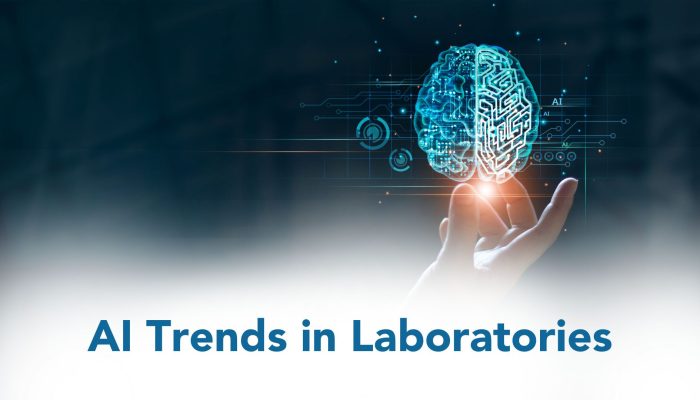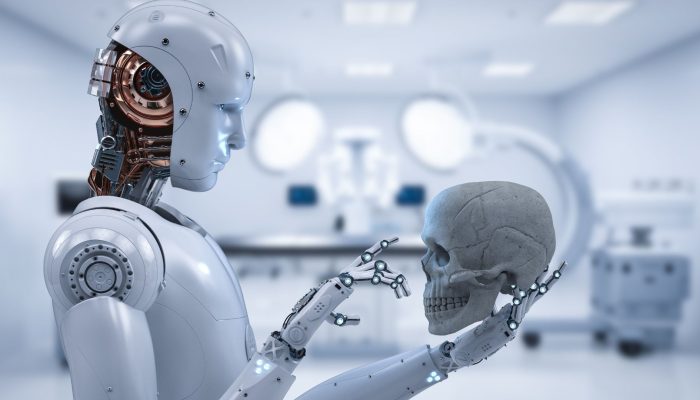AI Trends in Laboratories
Artificial Intelligence (AI) is revolutionising the way laboratories operate, offering new capabilities that improve efficiency, accuracy, and innovation. From automation to predictive analytics, AI is transforming every aspect of laboratory workflows. Let’s explore some key AI trends that are reshaping the field of laboratory science. One of the most significant impacts of AI in laboratories is automation. AI-powered systems can handle routine tasks such as sample processing, data analysis, and report generation. This not only speeds up processes but also reduces the risk of human error, leading to more reliable results. AI’s ability to analyse large volumes of data has made predictive analytics a powerful tool in laboratories. By predicting outcomes such as equipment failure or experiment results, labs can make better-informed decisions and optimise their workflows. In the field of personalised medicine, AI is playing a crucial role in analysing patient data to develop personalised treatment plans. AI algorithms can analyse genomic data to identify genetic markers and predict the effectiveness of specific treatments, leading to more targeted therapies. AI is also revolutionising the drug discovery process by analysing vast amounts of data to identify potential drug candidates. This has the potential to significantly accelerate the development of new drugs and reduce costs associated with traditional drug discovery methods. AI is improving quality control processes by analysing data from sensors and monitoring systems to detect anomalies. This helps ensure that products meet quality standards and reduces the risk of defects. AI algorithms can analyse images from microscopes and other imaging devices to identify patterns and anomalies. This is particularly valuable in diagnostics, where AI can aid in the early detection of diseases. IoT devices in laboratories enable the collection of real-time data from various sources, such as equipment and sensors. This data can be analysed by AI systems to optimise processes and improve decision-making. Connectivity solutions streamline data transfer, integration, and interoperability between different laboratory automation platforms and informatics systems (Mana Àbdaulh Ali Al Zamanan, 2023). In the realm of scientific literature and patient records, AI’s natural language processing (NLP) capabilities are invaluable. NLP enables AI to extract relevant information from vast amounts of text, aiding in data analysis and decision-making. AI-driven robots are increasingly used in labs for tasks such as sample handling and experiment conduction. These robots improve efficiency and safety by reducing the need for human intervention in potentially hazardous environments. AI can help labs ensure compliance with regulatory requirements by analysing data to identify areas of non-compliance and suggesting corrective actions. This reduces the risk of regulatory issues and ensures that labs operate in accordance with relevant standards. In conclusion, AI is transforming laboratory operations in ways that were previously unimaginable. From automation to predictive analytics, AI is enhancing efficiency, improving accuracy, and driving innovation in laboratories around the world. As AI continues to evolve, its impact on laboratory science is only expected to grow, leading to exciting new possibilities in research, diagnostics, genomics and healthcare. Did you know that OnQ Software and COMPUTD are hosting an interactive workshop at Analytica in Munich that focuses on the integration of AI in labs to enhance efficiency and innovation. Whether you are new to AI or have some experience, there will be something for everyone. Visit us at Analytica, or contact us. Ahmad Barnawi, A., Al Otaibi, M. J., Alhashash, S. Y., Alfouzan, M. S., Alotaibi, M. B., Alduways, A. H. B. M., … Alaqeel, M. A. M. (2023). Trends in Laboratory Automation and Robotics. Journal of Namibian Studies, 36(S2), 1993-2004. ISSN: 2197-5523 (online).
Here are the AI trends in Laboratories
1. Automation for Efficiency
2. Predictive Analytics for Informed Decision Making
3. Personalised Medicine and Genomics
4. Accelerating Drug Discovery

5. Quality Control and Assurance
6. Image Analysis for Diagnostics
7. Internet of Things (IoT) and Connectivity
8. Natural Language Processing for Data Extraction
9. Robotics for Lab Automation
10. Regulatory Compliance
References


